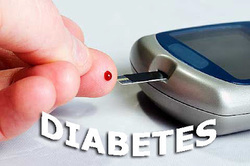
What is diabetes?
• It is a disease that affects how the body processes and uses food for energy. Its main symptom is glucose high (sugar) levels.
• The body converts carbohydrates protein and fat food into glucose, the main source of energy for cells.
• For glucose, the cells need insulin, a hormone produced by the pancreas.
• The hormone insulin acts as a key: allows glucose to pass through the cell wall. In the absence of insulin or when the body does not react properly to the insulin, glucose does not reach the cells and remains in the bloodstream. As a result, blood sugar levels increase.
• When blood sugar levels remain high, we talk about diabetes. If those chronically high levels of sugar are not treated, they produce damage throughout the body. Poorly treated diabetes is at greater risk of lead to blindness, kidney failure, neuropathy, including heart attacks and ictus.
Is there a cure for diabetes?
• Diabetes is a chronic disease with no cure.
When should I call the doctor?
• Diabetes requires a close relationship with the doctor and regular visits.
• At the risk of dehydration involved in disease, you should contact your doctor immediately if vomiting or diarrhea or when fluid intake is impossible for some reason.
• Any significant change in blood sugar levels must be reported to the doctor.
What are the symptoms of diabetes?
Associated with high levels of sugar and include:
• Excessive urination
• Intense thirst
• Appetite exaggerated
• Weight loss
• Increased risk of infections (especially skin infections and vaginal yeast and yeast)
How is diabetes diagnosed?
• Blood tests determine the levels of sugar. The photo is taken in the morning, fasting. Normally levels remain between 70 and 100 milligrams of sugar per deciliter (mg / dl), despite an overnight fast.
• When fasting glucose levels exceed 125 mg / dl were diagnosed with diabetes.
• Values above 124 mg / dl required for signs and risk factors that may increase the likelihood of complications. These are the most important risk factors in the physician shall be:
• Obesity, especially abdominal (worse for the "apple type" the "Pear", in which the fat accumulates in the hip).
• Hypertension
• Deposits or filtration of blood in the retina.
• Loss of sensation in the legs.
• Weak pulse in the feet or abnormal pulses in the abdomen.
• Blisters, ulcers or foot infections
How is it prevented?
The best preventive measures are:
• Maintain proper weight.
• Follow a diet balanced.
• Exercise daily (at least half an hour of moderate physical activity per day).
Despite all this, you can do many things to reduce the risk of complications in diabetes. A diet healthy, appropriate weight and rigorous control of blood sugar levels and cardiovascular risk factors prevent many problems.
Get free consultation online - 24 Hour's Free Support at http://www.herbalcureindia.com/free-consultation.htm to prevent cardiovascular disease, natural remedies for diabetes mellitus and treatment for high blood pressure.
 RSS Feed
RSS Feed